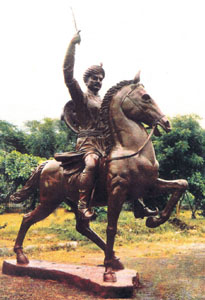<Back to Index>
- Revolutionary Leader Rao Kadam Singh, 1800+
- Revolutionary Leader Rao Tula Ram, 1825
- Commander of the Indian Forces Pran Sukh Yadav, 1802
PAGE SPONSOR
Towards the end of June, Britishers also formed a corps (mainly of the unemployed Europeans) and the corps was termed as Khaki Risala and led by Major Williams and Dunlop.
The Gujjars dug up the old guns which were buried at Parikshitgarh during the reign of Gurjar King Nain Singh, half a century before and destroyed the British army posts and police station of that territory. Gujars of Bessuma and Enchi village played a major role with Rao Kadam singh in this revolt of 1857.
At last Kadam singh along with his Gujjar clansmen were defeated after sudden attack of Khaki Risala, all the leaders and their followers were either killed or hanged.

Rao Tula Ram (Hindi: राव तुला राम) (c. 9 December 1825 – 1863) was one of the key leaders of the Indian rebellion of 1857, in Haryana, where he is considered a state hero.
He is credited with having "obliterated every vestige" of
the British rule from the region that today is southwest Haryana during
the Rebellion, and also helping rebel forces fighting in the historic
city of Delhi with men, money and material. Noted as a good
administrator and military commander, after the 1857 uprising ended, he
left India, met rulers of Iran and Afghanistan and also established
contacts with the Tsar of Russia, to seek their help to fight a war to
free India from the British. His plans were cut short by his death from dysentery in Kabul on September 23, 1863, at the age of 38.
Rao Tula Ram was born on 9 December 1825 in a noble Rao Bahadur Nirpur Yadav family of Rao Bhadur Garhi - Bolni in the village of Rampura (Rewari). His father was Puran Singh, his grandfather Rao Tej Singh and his mother's name was Gyan Kanwar, daughter of Rao Zahari Singh, a local jagirdar.
Rao
Tula Ram's Istemraree estates were confiscated by the British in 1859,
though proprietary rights of his two wives were retained. In 1877, his
title was restored to his son Rao Yudhister Singh, who was made zaildar.
Pran Sukh Yadav in Hindi प्राण सुख यादव (1802 - 1888) was an extraordinary military commander of his time. He was a close friend of Hari Singh Nalwa and famous Punjab ruler Maharaja Ranjit Singh. In his early career he trained Sikh Khalsa army. After the death of Maharaja Ranjit Singh he fought in both the First and Second Anglo - Sikh Wars, due to his extreme hatred towards Britishers after the defeat of Sikhs he started giving military training to the farmers of Narnaul and Mahendragarh region. Later during the First Rebellion of India in 1857 he fought along with Rao Tula Ram of Rewari against Britishers at Nasibpur. In his last years he settled at Village Nihalpura, now in Alwar District of Rajasthan, along with the kins of dead soldiers who died fighting with the Britishers at Nasibpur and joined Arya Samaj after meeting Swami Dayananda Saraswati.